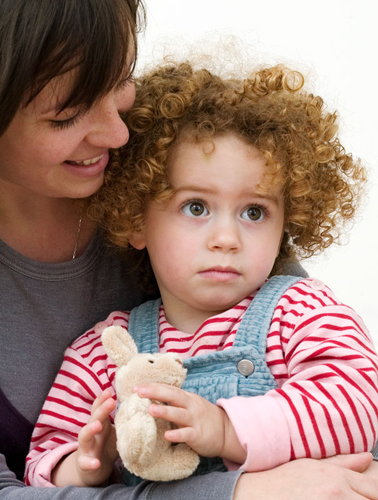Your child’s experience of the world will be shaped
by you and drawn from a range of influences that will all have their
roots in your past. She will naturally look to you for guidance on what
is “right and wrong”—and will push the boundaries of acceptable behavior
during the learning process.
“Your child has rights—but so do you. It is not an ‘either/or’ situation, but a balance of needs and actions.”
“When you are a parent
it’s important to remember that you are the adult and your toddler is
only a child. She needs you to stay calm.”
To be a parent is to tread a
fine line between wanting to “do what’s best” based on the knowledge and
understanding of others; and wanting to do “what feels right” based on
personal instinct and the bond with your child. A first-time parent is
going to feel more uncertain than one who has several children, but when
trouble hits it can be easy to feel overwhelmed by the conflicting and
well-meaning advice that abounds.
Avoiding comparisons and choosing advice
"“Lisa and I have been
best friends since school, and our kids are about the same age, but she
has the support of both sets of parents and her husband, whereas I am
pretty much on my own when my husband is stationed overseas. I get so
tired of hearing about their latest vacation and how brilliant her
children are. It just makes me worry about mine even more.”" Families
are infinitely varied in shape, size, and gender mix, but one thing
seems to be universal—when there is a toddler on the loose, and when
there is a problem, everyone has an opinion and a story that they would
like to share. The trouble is that other people’s toddlers are not
yours—and no two children are exactly the same. It can be very tempting
if you are feeling unconfident to compare your child’s progress with
that of another child of the same age. As this guide will stress again
and again, there are guidelines and milestones but no fixed rules when
it comes to child development. Unless there are special needs most children will have reached a similar stage of development by the time they start school.
Swapping stories and
tactics with other parents is often invaluable, but unwanted advice can
be hard to take. If by nature you tend to be unsure of yourself then
other people’s views can make you feel put upon, and may lead you to
feel stressed or guilty, too. This would be a good time to learn to
listen objectively rather than take things personally. You may like to
have a chat with those who have overstepped the mark to explain that you
appreciate their advice and can see their method works for their child,
but that you choose to do things a different way.
Keep in mind that:
Others who have been through it may have something useful to say.
Some books, articles, and TV programs offer sound advice, but not all.
Your
pediatrician is better qualified than you to diagnose a health problem.
Do, however, always follow your instincts if you think your child is
ill.
Unless
your child is in physical, emotional, or psychological danger, you are
more entitled than anyone else to decide what is right for her.
A learning curve
While advice is useful, especially if you’re a first-time parent,
try to assess your child’s needs yourself and be confident in the
decisions you make.

Separating your needs from those of your child
Sometimes we can
become confused between which actions are being taken for the good of
our child and which are for our own good. A classic example occurs at
bedtime. There are few experiences more likely to make your heart melt
than your cuddlesome toddler snuggling in for a bedtime story and
telling you she loves you, or the sight of your otherwise “terrible”
two-year-old lying asleep with the look of an angel. Is it any wonder
that parents give in when their little one gets up for more cuddling or
wants the comfort of snoozing in their bed rather than the child’s own?
It is not only toddlers who suffer from separation anxiety: parents do,
too. Parents want to know they are needed and don’t want to risk being
rejected or disliked by their child, by causing them distress.
Provided you act with
calmness and clarity, rather than anger or impulse, your child will not
feel rejected and will eventually learn to feel safe without your
physical presence: a vital survival skill. If, on the other hand, you
give in to her immediate impulse to satisfy your own needs, you are in
danger of delaying her development over time. Be aware of when you are
acting for your own need rather than the good of your child.
Your child’s needs
Consistency and routine are essential in the early years. If you
are less than consistent, your child will find your weak spot and may
use it to his advantage!
